TRIBUTE
Tony Heard — a journalist’s journalist, and one of the bravest men I have known
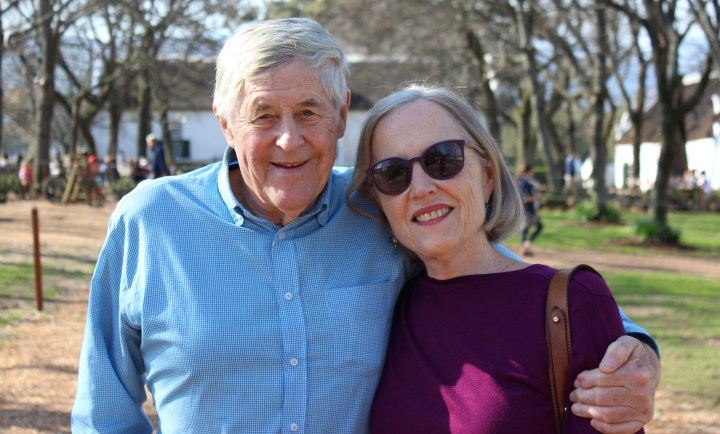
Tony Heard, who died on Wednesday 27 March 2024 at the age of 86, was one of the bravest people I have known. His quiet and fearless opposition to the apartheid regime brought him many accolades, and cost him his job. He was a journalist’s journalist, a man for whom principles counted above all else.
I have been privileged to work under some of the finest editors South Africa has produced. I am proud to say that I was working for three of the best of them when they were fired — Allister Sparks, Tony Heard and Alide Dasnois. For all three, being fired was a badge of honour.
I first met Tony Heard in mid-1981. He had been editor of the Cape Times for 10 years then, and had built on the newspaper’s fine liberal history by transforming it into an internationally recognised, uncompromising anti-apartheid daily.
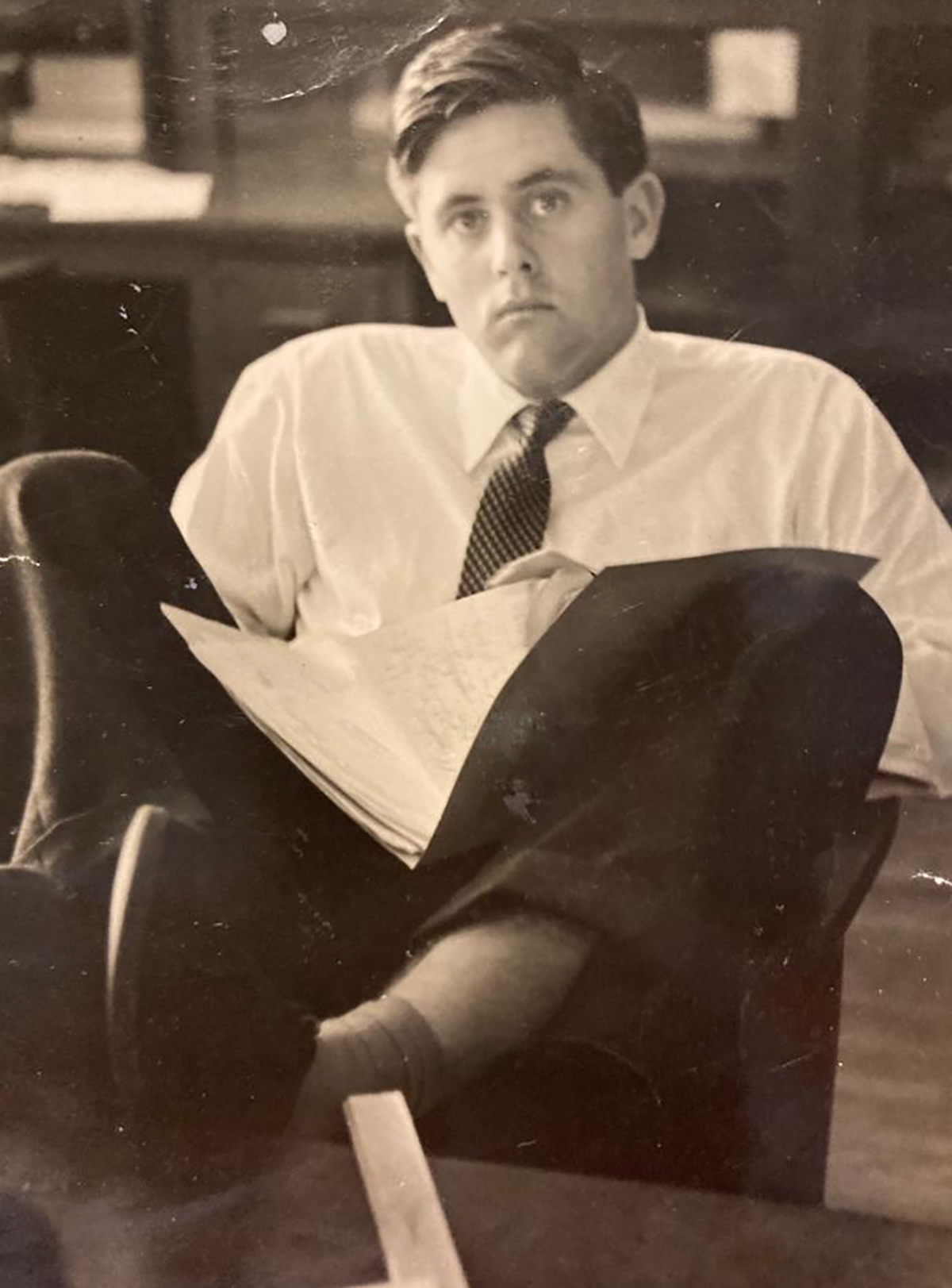
Tony Heard as a young journalist. (Photo: Supplied)
It was a proud moment for me, becoming a reporter on the Cape Times.
I grew up with it in our home in Somerset West. My parents, both veterans of World War 2 and the Springbok Legion and Torch Commando, read it avidly, not least for the crossword and the bridge problem.
It was their political torch bearer and source of reliable information.
At high school (Sacs in Newlands), copies of the Cape Times were always available in the library and on the desks of various teachers, and we were encouraged to read them.
Our headmaster, Robin Whiteford, wrote scathing anti-apartheid letters that were published under the pseudonym, RAL Balizzy (R for Robin, ALBa for white, Lizzy for Ford, the Tin Lizzy). He would read to us from Cape Times’ editorials on the latest apartheid atrocity at morning assembly.
Some of that extraordinary reporting on the Cape Times that shaped my youthful political opinions was done by a young Tony Heard.
It was his reporting that was recorded in history as the main account of the historic Langa anti-pass march led by the youthful PAC leader Philip Kgosana on 30 March 1960.
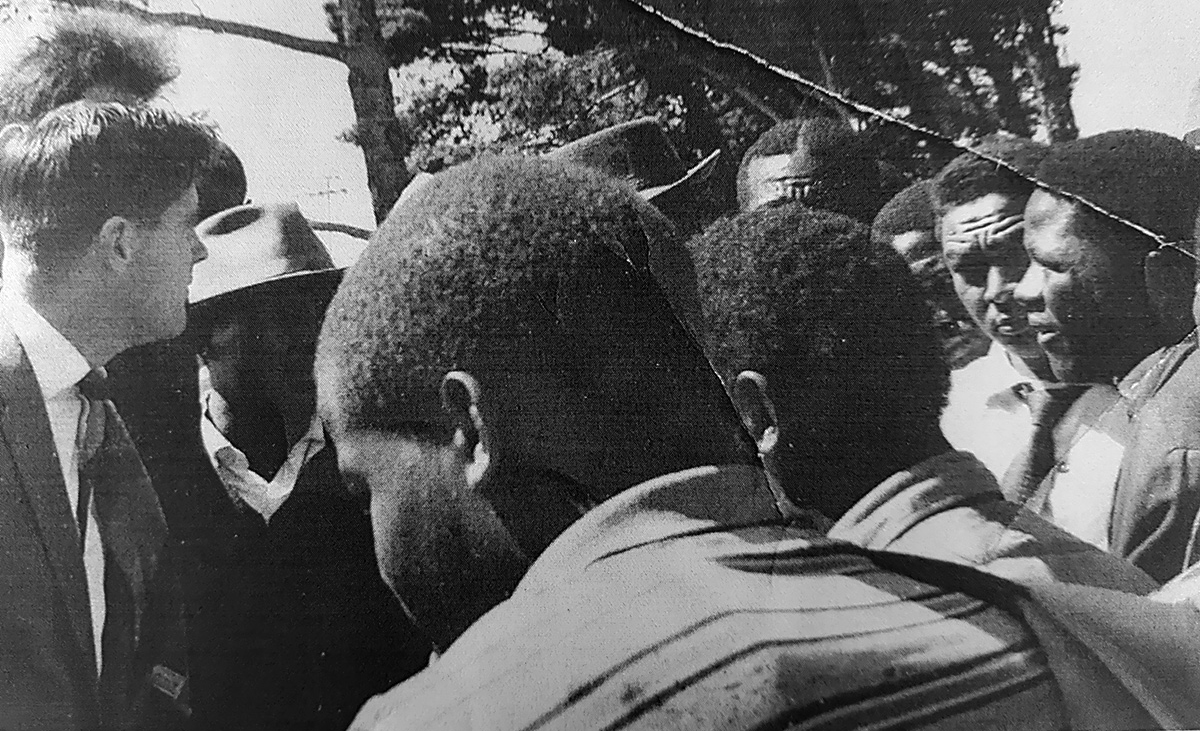
Tony Heard at the Langa anti-pass march in 1960. (Photo: Supplied)
It was a pivotal moment for Heard, and years later, he was instrumental in the campaign to get Cape Town’s De Waal Drive renamed for Philip Kgosana.
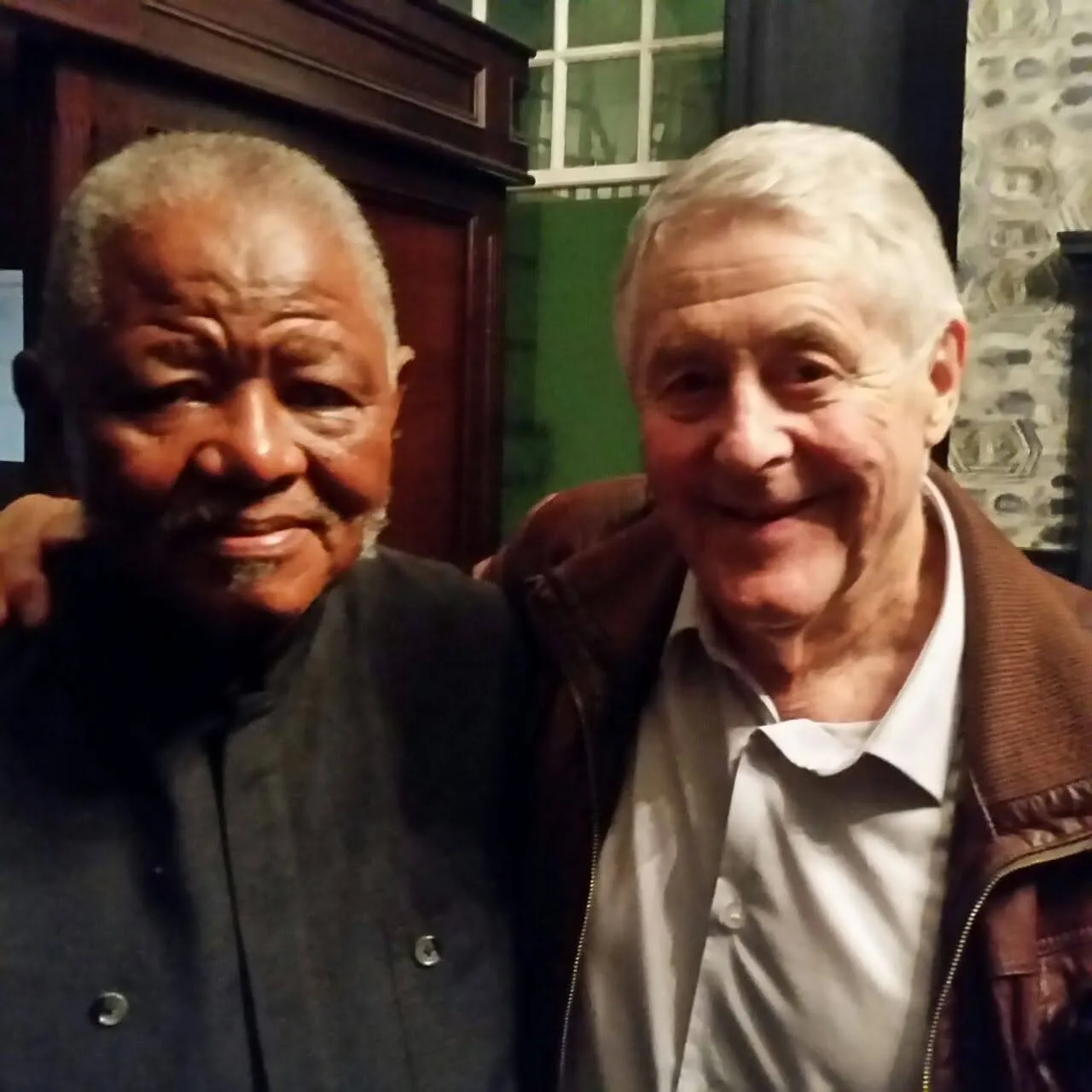
Tony with Philip Kgosana. (Photo: Supplied)
The first time I met Tony Heard was when he welcomed me and the other “cadet” reporters assigned to the newspaper to his office on our first day. His words stuck with me: “This newspaper, and I, will back you all the way to the courts and to jail if necessary, as long as you write the truth. And there is no need to ever embellish the truth — apartheid is so awful that we do not need to lie”.
And back us he did. Fearlessly. Tony Heard was one of the bravest people I have ever known.
On Monday 4 November, 1985, my wife-to-be and I were driving back from Ceres after spending a long weekend hiking and kloofing the Witels River. We drove past a Cape Times poster that read, “Oliver Tambo speaks”. It took a few moments to sink in.
We pulled into the nearest shop and bought the paper — on page one, a small story was headlined, “Tambo Urges: Create climate for talks”. It carried a cross-reference to a full-page oped article headlined: “A Conversation with Oliver Tambo of the ANC”.
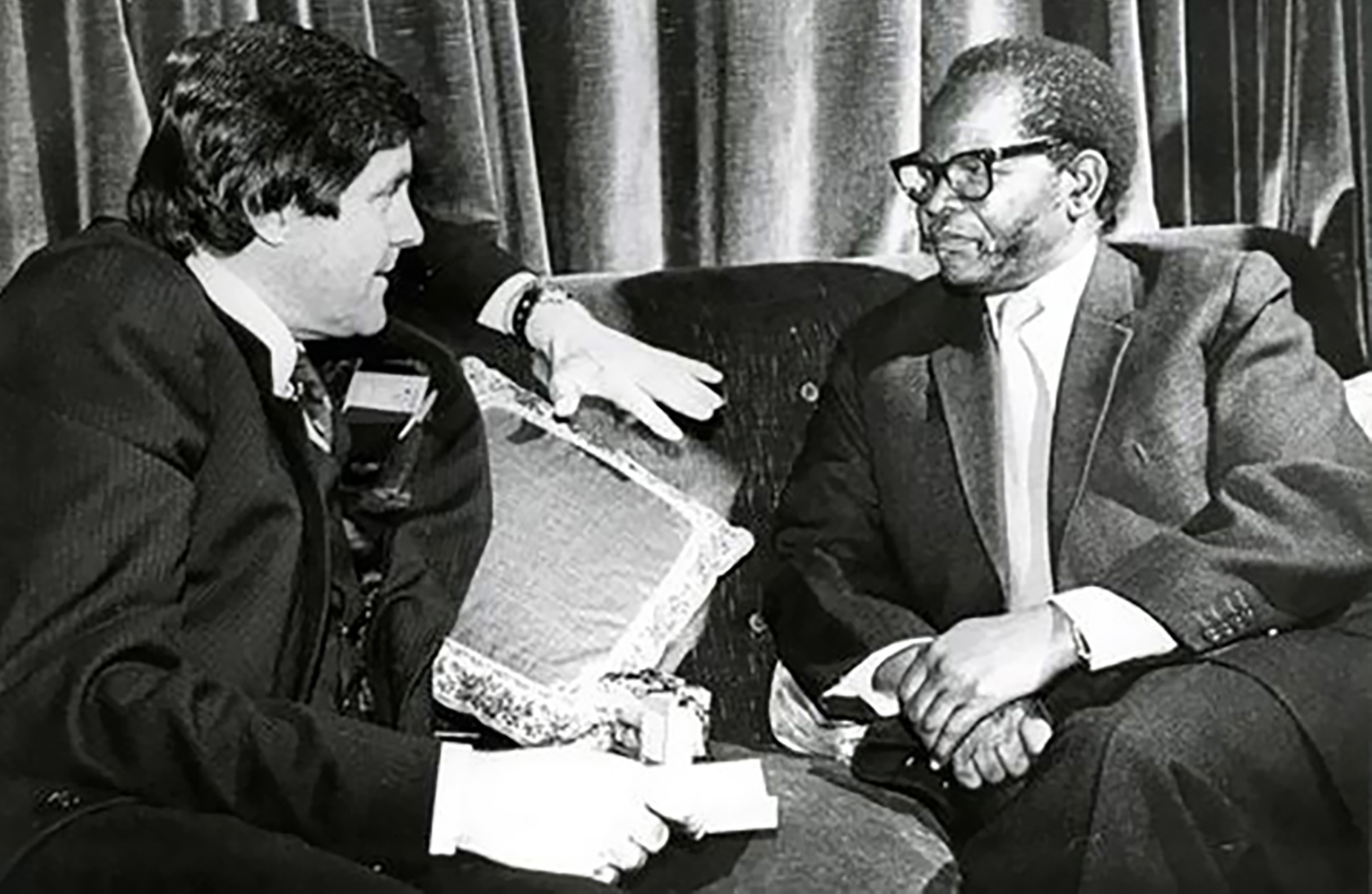
Tony Heard with Oliver Tambo. (Photo: Supplied)
Writing this, 39 years later, it is hard to convey just how significant a moment that was, not just in the history of South African journalism, but in South African history.
It was just about as comprehensive a “fuck you” to the apartheid regime as it was possible for a newspaper to deliver — and it had been written by that newspaper’s editor.
Significantly, it was written at the peak of the apartheid state of emergency, imposed nationwide as the uprising against the state intensified.
As Heard was to later write in his autobiographical memoir, “Cape of Storms”: “I acted on my own, representing my newspaper and profession. It had nothing to do with big business figures who had taken initiatives to meet Tambo earlier that year. It had nothing to do with opposition figures or anyone else.
“It had to do with journalism. No one in South Africa, up to that point, had been able to know what the ANC stood for. That was the job of journalism to put right, to shed light on dark corners.”
The impact of that interview reverberated around the world.
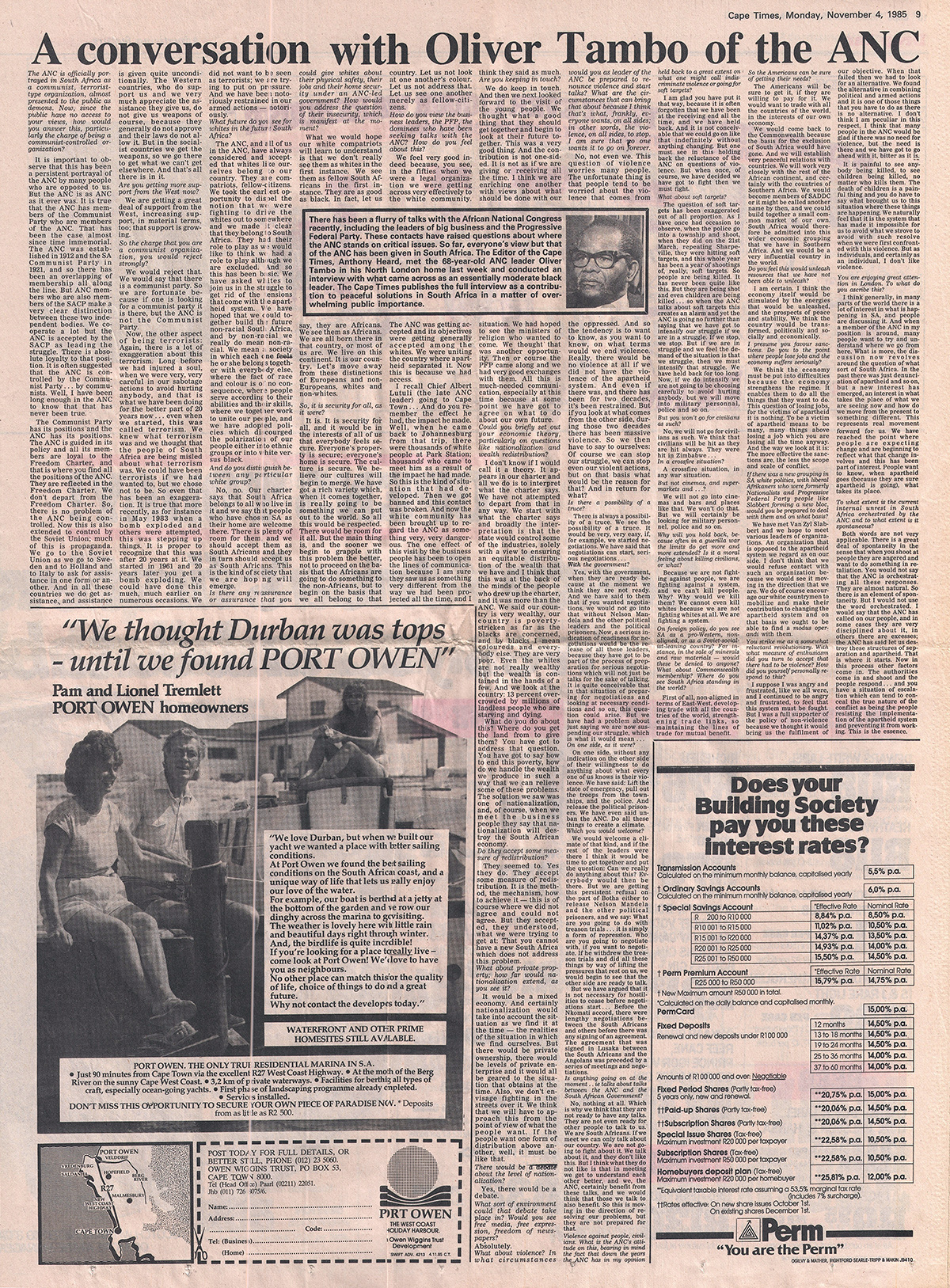
Tony Heard OR Tambo interview. (Photo: Supplied)
The Cape Times, with a readership then of around 300,000, may have been a local newspaper on the southern tip of Africa, but the Tambo interview, and Heard’s relentless publishing of the truth about apartheid South Africa, gave it international recognition — and eventually led to Tony Heard being fired by his boyhood schoolfriend, South African Associated Newspapers (Saan) managing director Stephen Mulholland on the evening of 7 August 1987.
Mulholland and the company strenuously denied that Heard had been fired because of the Tambo interview, saying it was a commercial decision. We all knew that was bullshit.
The company offered Tony a R1-million settlement package (a fortune in those days) if he would keep his mouth shut, sign a non-disclosure agreement, and remain on for two years to write a hagiographic book about the company.
“I was warned that, if I was thrown out, all I would receive was the smallish amount in the pension fund — and the keys would be taken out of my company car. The final straw was being asked to sign a letter confirming what I could never confirm: that the move was not political.”
I had come up against that deep-seated conservatism that ran through the company when I was appointed as Namibian correspondent for the Saan group of newspapers from 1983 to 1985, a move that Heard had organised.
He knew the war between South Africa and Swapo guerrillas was entering a key phase and that independence was on the cards. He wanted a correspondent in place that he could trust.
I arrived in Windhoek to find that very little of what was actually happening in the war zones was being reported on. The Special Operations K Unit of the SA Security Police, Koevoet, was running rampant, committing unspeakable atrocities against both captured guerrillas and the civilian population.
My reports from the war zone, including sworn affidavits from torture survivors, were given big coverage in the Cape Times and the Rand Daily Mail, then under the editorship of Rex Gibson.
But other newspapers in the Saan group refused to carry them, and a growing lobby of conservative editors and managers, led by Mulholland and Tertius Myburgh of the Sunday Times, wanted me fired. Heard and Gibson fought back, and I hung in in Namibia until mid-1985, returning to the Cape Times just in time for the townships of South Africa to erupt into a full-scale state of uprising.
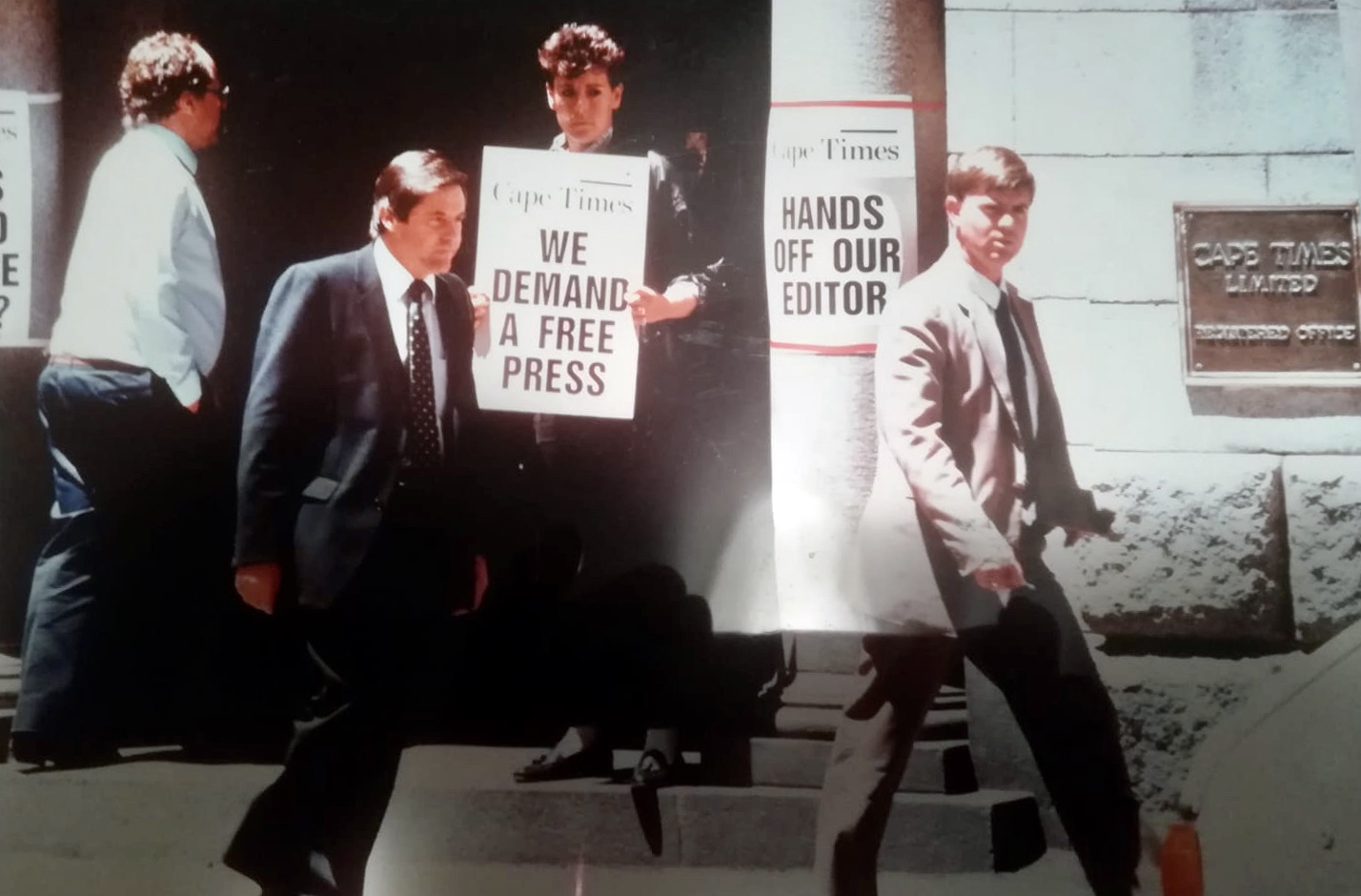
Tony Heard and Marianne Thamm outside the Cape Times building. (Photo: Supplied)
As one of the few reporters with actual experience of covering a war, I was quickly thrust into the heart of the townships, reporting on the Witdoek vigilante and police destruction of Crossroads, the Trojan Horse shootings, the Battle of Belgravia Road, and the murders of the Gugulethu Seven, among many others.
Heard backed us all the way, particularly Chris Bateman and me for our reporting on the Gugulethu Seven.
When I was put on trial under the Police Act for my coverage for the BBC and the Cape Times of the murders of the Seven, Mulholland withdrew my legal funding on the eve of the trial. Heard and Gerald Shaw pulled out all stops, and secured funding from the BBC, the SA Council of Churches, and, I suspect, the International Defence and Aid Fund.
It was scary and exhilarating all at once, a crazy time.
In his book, “The Cape Times: An Informal History”, former deputy editor Gerald Shaw quotes me as saying, “It was surreal and spooky but we were dealing with surreal and spooky people… I left the Cape Times at the end of 1987 after Tony Heard was sacked by Stephen Mulholland. Much as I admired the new editor, life wasn’t the same without Tony Heard’s fired-up, gut instinct sense of morality, and often crazily impulsive way of editing one of the great newspapers of South Africa”.
Read more in Daily Maverick: 8000 Days: Ambush in the office
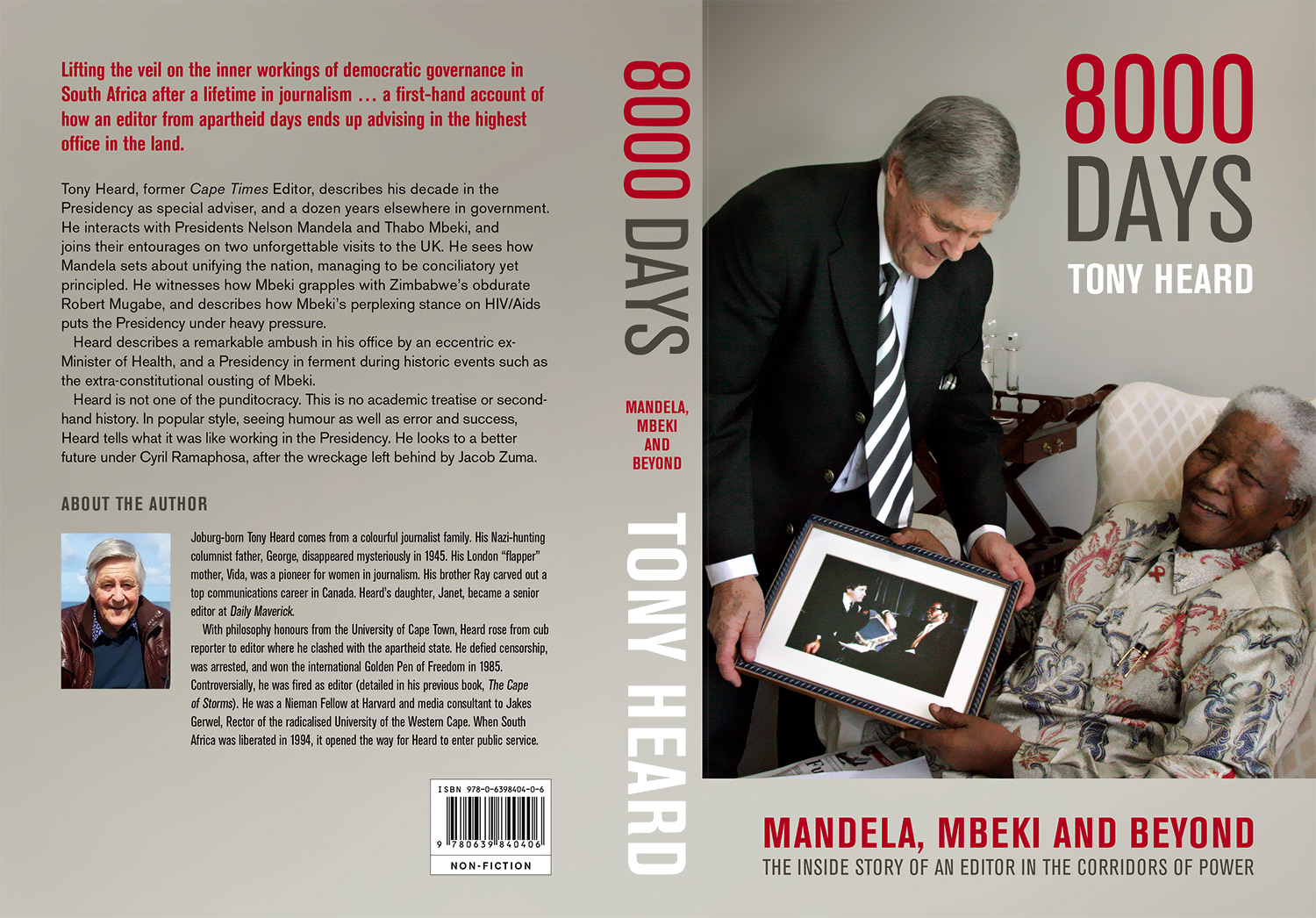
Tony Heard’s 8000 Days Cover. (Photo: Supplied)
Tony Heard was not a flamboyant man. He often came across as a bit diffident, a bit shy. But there was steel there, steel that was forged as a young boy. His father, George, was one of South Africa’s most celebrated political journalists, waging a campaign not only to ensure South Africa entered World War 2 on the side of the Allies but also against Nazi sympathisers in the National Party and the far rightwing Ossewabrandwag.
“Much of George’s weekly column in the Sunday Times was devoted to ferreting out those who were working for a Nazi win. And there were many Afrikaner Nationalists… who were praying for a Hitler victory,” Tony wrote in Cape Of Storms.
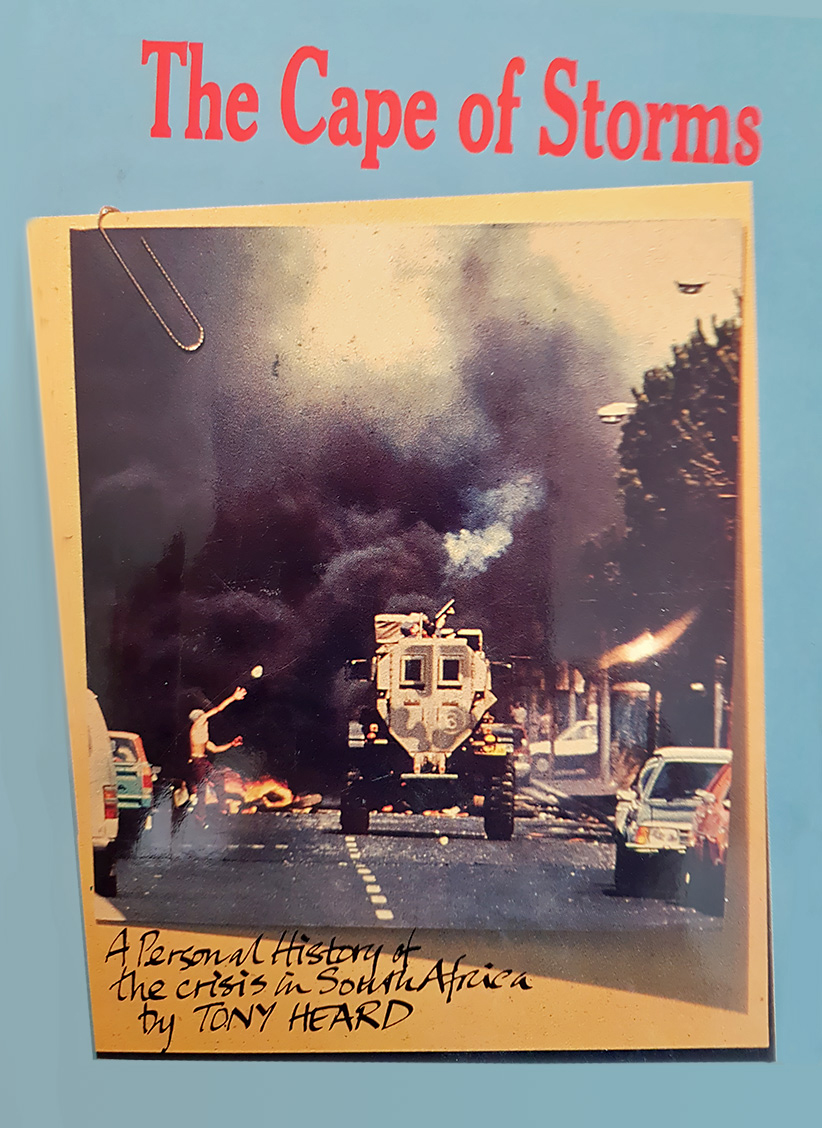
‘Cape of Storms’ book cover. (Photo: Supplied)
George was a marked man. The Ossewabrandwag and others hated him. On 8 August 1945, he vanished without a trace.
Tony wrote: “George Heard disappeared when I was seven and my brother Raymond nine. I recall my father only in faded snapshots… the men who hated George, the Afrikaner Nationalists whom he had attacked so severely in the war years, had their day. They came to power in 1948.”
In February this year, Tony Heard was diagnosed with cancer. He had just completed the final draft of his third book – the story of his family’s lifetime search for answers to the mystery of George Heard’s disappearance, with the working title, Cost of Courage. He handed it into the care of his second child, Janet (Day Editor at Daily Maverick), to be finalised for publication.
A message from his family yesterday read:
“He is survived by his beloved partner Jane; his children Vicki, Janet, Pasqua and Dylan and their partners John, Steve, James and Emma; his brother Ray; grandchildren Jessica, Tyler and Ella, and other family members.
“Tony was a fiercely independent thinker who has left an indelible footprint in journalism and beyond, with a lifelong commitment to non-racialism, media freedom and social justice. As a family, we mourn his passing and we thank him for his courage, his unwavering love, kindness, idealism and unique storytelling. He has caught his final wave, may he rest in peace.”
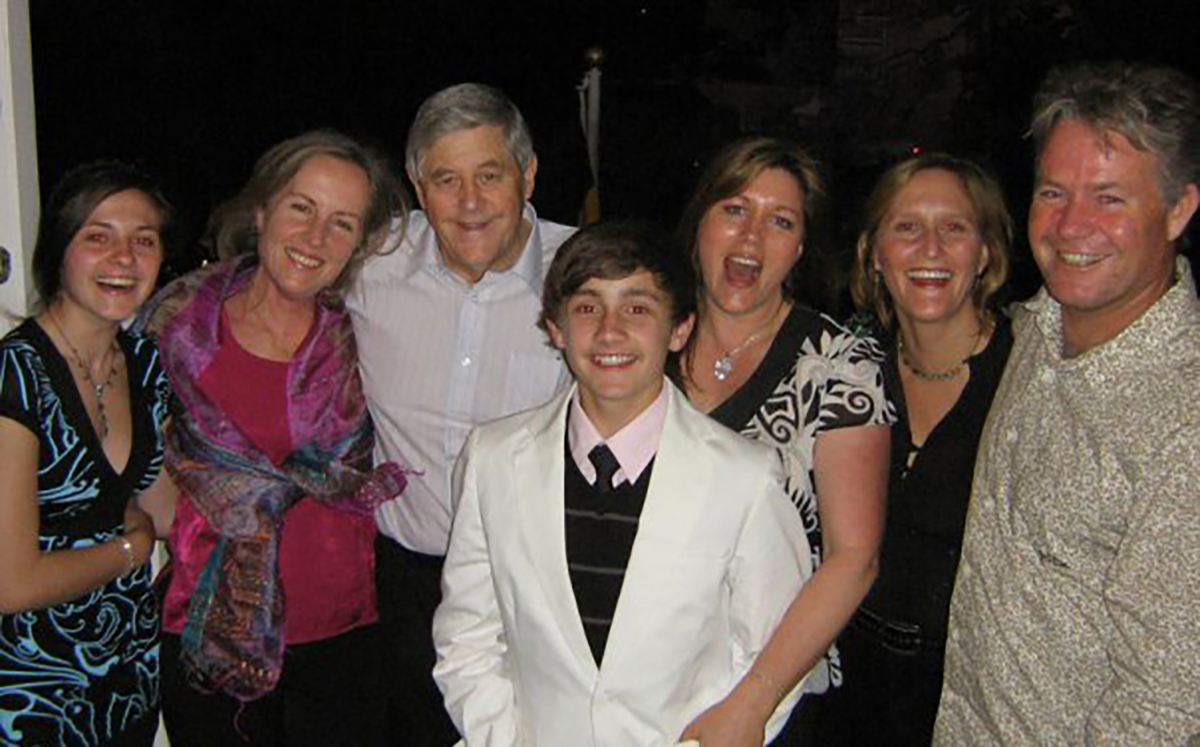
Tony Heard’s 70th Birthday, celebrated at Leinster Hall. (Photo: Supplied)
From 1990-1994 Tony was media consultant to the Rector of the University of the Western Cape, the late Prof Jakes Gerwel.
In the new South Africa, under the presidency of Nelson Mandela, he served as special adviser to Kader Asmal, the Minister of Water Affairs and Forestry (1994-1999) and Minister of Education (1999-2000).
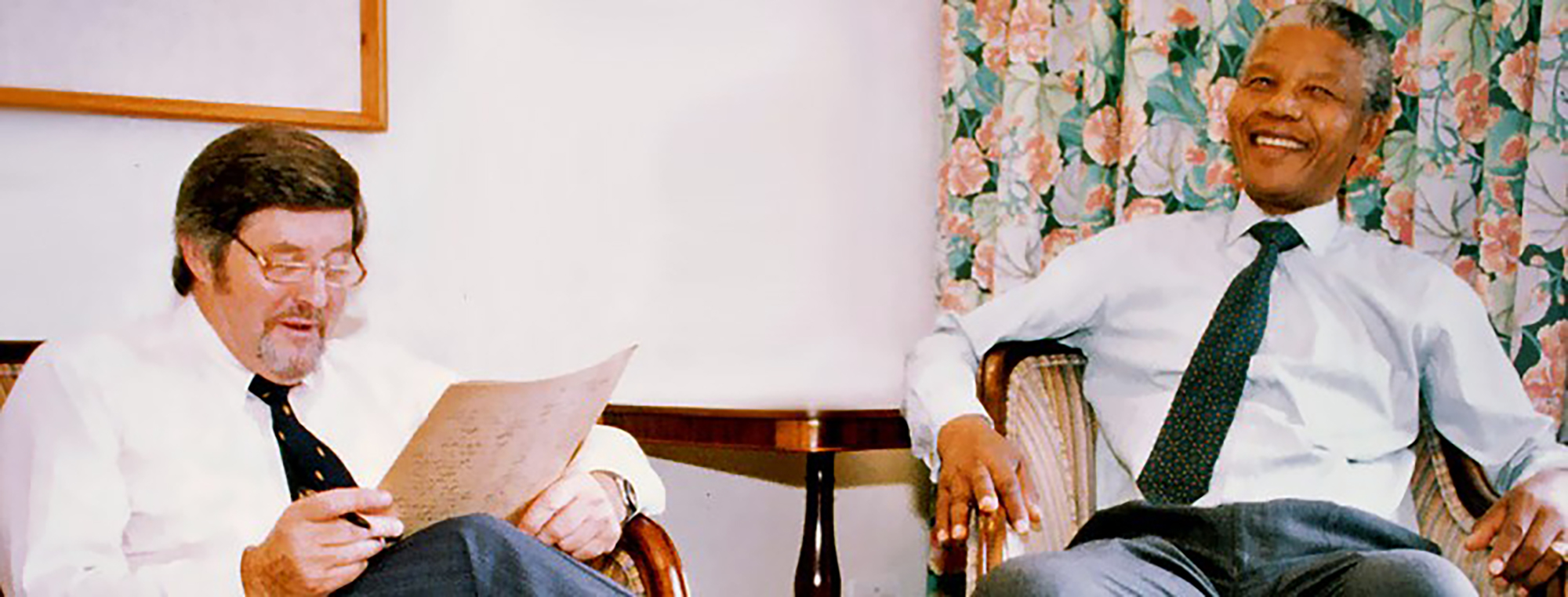
Tony with Nelson Mandela.(Photo:Supplied)
In 2000 he was appointed on renewable contract as special adviser to the Minister in the Presidency (the Mbeki era), quitting at the end of January 2010, months after Jacob Zuma became president in 2009.
“He (Zuma) showed us all where the basement lay in our national fortunes,” Heard wrote in his second book, 8000 Days.
He worked as an adviser in the Department of Minerals and Energy between 2011 and 2016.
“My last day of government service was 30 June, 2016, shortly after Mosebenzi Zwane had replaced Ngoako Ramathlhodi as minister of minerals. The die was cast. An awful period of incipient State Capture was ahead.” (8000 Days).
Hamba kahle, Anthony Hazlitt Heard, safari njema. ‘n Groot boom het geval – a big tree has fallen. DM
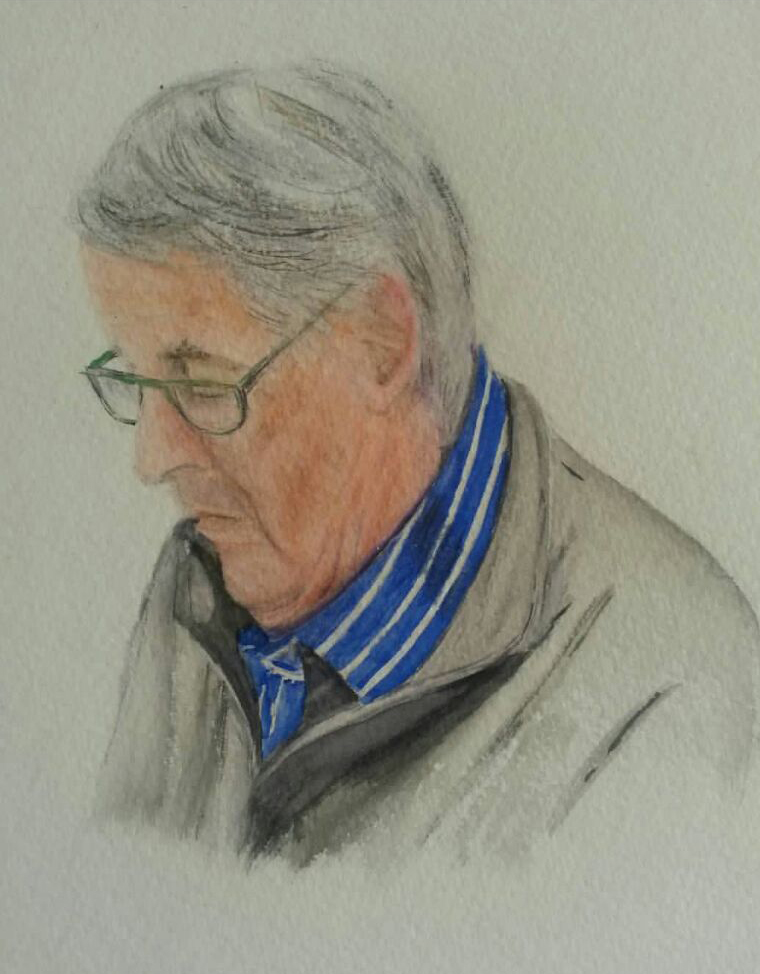
A painting of Tony Heard. (Photo: Jane Porter)
Tony Weaver is a journalist.






 Become an Insider
Become an Insider
Tony W, a lovely tribute to Tony H, with insights and anecdotes only you could offer, as somebody working for him and then with him for so long. Condolences to the Heard family.
His was an era that uncompromisingly showed the societal value of principled journalism. What a life. What a man. RIP Tony
Well put, Patrick. Those were tough times, but we came through it all.
It speaks loudly about the ANC how courageous non-ANC opponents of apartheid have been airbrushed out of history. Journos like Heard, Sparks, Mervis and — yes — Zille, obsessed with the truth and decency; academics like Webster, SP Cilliers van Zyl Slabbert, clergymen and others who defied apartheid.
Where are the commemorations of the Torch Commando and Springbok Legion? Why are they not taught about in schools?
It was the founder of the Cape Times’ arch-rival the Argus, Saul Solomon, who, as a Cape MP later in life, when confronted with a walkout ahead of an anti-racist speech, opined “I’d rather talk to empty benches than to empty heads”. So little has changed.
Thank you Tony Heard, Tony Weaver, and also old friend Gerald Shaw. How we loved the Cape Times, with all the terrible news it managed to carry. How we cannot bear to even see it on a newsstand today.
Yes…how time marches on taking ethics with it!
Sadly racism is still alive and well today inspite of our new Constitution and good intentions for a Rainbow Nation. The DM stands testament to the Heard ideology – long may it continue to investigate and report in a fair and truthful manner supporting journalists like Heard and others who risked their lives by telling the truth.
A journalist of character and integrity. RIP
A beautiful tribute to a courageous man.
Thanks for the tribute. Heard was among the last of a shrinking breed of journalists. Not many left, I’m afraid.
Thank you for these memories. The Cape Times was an essential in our lives as we were growing up. As someone mentions here, where are all the stories from those journalists who spoke out against the apartheid regime. We’re all lumped into the same bucket of ‘previously advantaged’, yet so many people disregarded their own safety and spoke out and acted against it. I remember my father telling me how George Heard’s wife, I think her name was Vida, had written a book after her husband disappeared, and how she managed to get herself to sleep at night by counting backwards from 100. I think that’s what it was, something to do with counting. My father only said George Heard had gone to buy the newspaper one Sunday morning and disappeared, never to be found again.
Thank you Tony Weaver a comprehensive tribute to Tony Heard. You captured his character so well. Determined, supportive, he was deeply reflective and a person of action. Those last qualities are a rare combination. Condolences to his wife children, partners and their children. Condolences to his colleagues and his friends. The real Cape Times is missed daily.
Thanks for a lovely tribute to Tony Heard, I enjoyed attending his book launch at the Book Lounge in Cape Town several years ago.
A life well led and trying to make our country a better place for all. RIP.
Could not have been a happy departure for this ANC apparatchik after all his efforts to destroy apartheid were rewarded with what has become a mafia ANC state. Thanks so much Tony. We’ll think of you every time a farmer is murdered, every pothole we hit that destroys our tires, every corrupt cop we have to bribe. But in the little bubble that is Cape Town your pals still pat each other on the back, great job done..
At least he had the guts to put his name to what he wrote – something you might like to try. How would you feel if your father disappeared after going on an errand? The legacy of apartheid is much more destructive than potholes – perhaps if the money spent in propping up South West Africa and the broederbond had been applied to education and housing the farm murders could also have been avoided.
Unnecessary.
An excellent tribute to an outstanding humanist.
A fine tribute….. just imagine too, to the 300, 000 copies sold daily of the Cape Times
Thanks, Tony Weaver, for this lovely tribute to a great and fearless man, Tony Heard. Hopefully the family will arrange a reprint of Tony H’s two previous books to coincide with the soon to be published one.
What a man and a great tribute. I keep reminding myself that if it wasn’t for the independent and courageous journalists and (mostly) independent judiciary, we would have already reached rock bottom. This is why I support DM!
Keep it up all of you, you have a huge responsibility and big shoe shoes to fill. THANK YOU!
Thank you Tony for this tribute. So lovely that someone who knew him so well could write this for us to remember his incredible contribution.
Echo that Maryann
Barbara and I have have just shared a toast to Tony, a fearless and principled journalist, in the Muizenberg house he loved and that we are honoured to have bought from him 21 years ago.
Condolences to the Heard family. RIP Mr Tony Heard. What a newspaper, The Cape Times under editorship of Mr. Tony Heard.
A wonderful tribute to a brave man indeed. Thank you Tony!
A wonderful tribute to a brave man indeed. Thank you Tony!
Thanks for a moving obit, Tony. Tony Heard was a staunch and loyal friend, an extraordinarily fine man who deserves great honour. Pasqua, Dylan, Vicki, Janet – you’re much in our thoughts today. Fond memories, all our very best wishes. Peter and Maggie
A great tribute, Tony, to the best editor I never worked for. I was lucky to know him through most of my adult life; a lively, inquiring, and also deeply responsible man; a father, husband and partner, courageous editor, hard working, yet fun to be with. Watched the 1995 World Cup final with him and dear Mary-Ann Barker, (then his wife), and danced in the streets of Muizenberg afterwards, in the delirium of happiness. That too, was part of his extraordinary character – the ability to be both serious and also joyful. Warmest wishes to his family, who loved him greatly – the legacy of a true mensch.
Dearest Tony (Weaver),
Thank you for this. Your piece was sent to me by another great journalist, Jackie Bosman, now in Oz. I write this from a grey, miserable, rainy Boston. So sad that so many of us are now scatterlings.
And yes, you and Tony Heard were among those who represented the best of journalism ANYWHERE. I look at the failure of the major media of the world to enter Gaza, where they know the IDF is deliberately targeting and killing journalists – 95 since October, almost all Palestinians, and I mourn how the media have lost their commitment to the truth, or giving voice to the voiceless.
I never met Tony Heard, but I always admired him, and his angry impatience at injustice. I know he did a lot more to further the aims of democracy than you note here, and how sad he must have been at what South Africa has become.
South Africa’s strongest attribute has always been its people, the most wonderful, loving, gregarious, don’t vok with me people in the world. God, how I miss you all.
Your piece was as much about you as him – men of integrity, men with a love for their birthplace and its people, and with eternal hope that South Africa will one day be free. Free of the corrupt and the tyrannical, free to rejoice in opportunity. Sent with love.
Thank you Sir Tony Heard for your service. Rest in peace
The Cape Times under Tony Heard was the natural way to start the day during my posting as Norwegian vice consul in Cape Town 1978-81. Upon reading the first critical editorial one August morning in 1978, I went straight to my boss, Consul General Egil Winsnes, with the question: -Will they not be arrested for this? His answer: -No, they write like this every day – and it has no impact at all! -I think today Egil, whom I came to appreciate very much, was wrong on this (he was mostly right). Over the years, the relentless criticism of inhumane and inefficient apartheid policies through the likes of Cape Times did indeed, I think, have the effect of tearing down the legitimacy of the minority regime and thus prepare South Africa for fundamental change. RIP, Tony Heard.